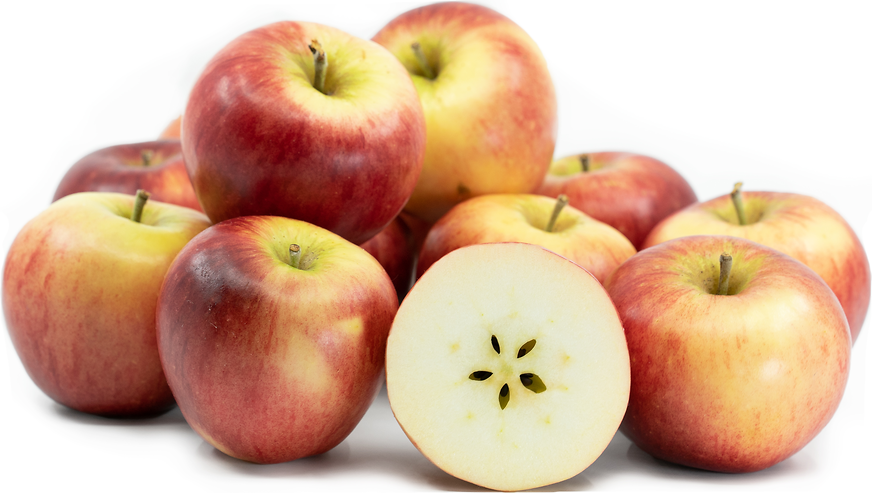


Smiler Apples
Estimated Inventory, 1 Lb : 0
Description/Taste
Smiler apples are a medium to large varietal, averaging 6 to 7 centimeters in diameter, and have an elongated, conical shape with lopsided, flat shoulders tapering to a narrow base with a short, stubby brown stem. The apple’s skin is smooth, glossy, and slightly sticky, covered in a layer of wax. The skin also has a bright yellow-green coloring, covered almost entirely in a brick red blush with some crimson striping and striations. Underneath the surface, the flesh is white, lightly tinged with green, and has a somewhat crisp, firm, and fine-grained consistency. The flesh also encases a moderately-sized fibrous core filled with dark brown, oval seeds. Smiler apples have a bright, sweet-tart flavor, comprised of sharp, acidic, and tangy notes mixed with fruity nuances, followed by a unique, peach ring-like aftertaste that subtly lingers on the palate.
Seasons/Availability
Smiler apples are available in the early fall through winter.
Current Facts
Smiler apples, botanically classified as Malus domestica, are a rare English variety belonging to the Rosaceae family. The apples were first recorded in the early 20th century in Surrey, England, and are favored by apple enthusiasts as a dessert or fresh eating variety. Smiler apples are primarily enjoyed as an out-of-hand apple to appreciate the variety’s distinct sweet and tangy flavor followed by a perfumed, fruity aftertaste. Beyond the apple’s date and place of origin, much of the Smiler apple’s history is unknown. The apple is not commercially cultivated and is only found in limited quantities throughout England. Smiler apples are most well-known as one of the unusual varieties preserved in the Heritage Orchard at Brogdale Collections in Kent.
Nutritional Value
Smiler apples have not been studied for their nutritional content. Like other apple varieties, the fruits are a source of vitamins C and E to strengthen the immune system and protect the cells against free radical damage. The apples also provide potassium to balance fluid levels, fiber to regulate the digestive tract, calcium and phosphorus to build strong bones and teeth, and other amounts of boron, magnesium, iron, copper, and zinc.
Applications
Smiler apples have a sweet and tangy flavor primarily utilized in fresh preparations. The apples can be consumed with or without the skin, and the variety’s complex flavoring is appreciated mainly out of hand. Smiler apples can also be chopped and tossed into green salads, mixed into slaws, or stirred into grain bowls. In addition to incorporating the apple’s flavor into dishes, Smiler apples can be sliced and layered into sandwiches, melted into grilled cheeses, or placed on peanut butter toast. The apples can also be served with soft cheeses, cooked into a jam, cut into wedges and dipped into caramel or chocolate, or sauteed with butter, brown sugar, and spices to create a decadent dessert. Beyond culinary applications, Smiler apples can be blended into smoothies or pressed into fresh juices and ciders. Smiler apples pair well with spices such as ginger, cloves, cinnamon, nutmeg, and allspice, vanilla, maple syrup, cheeses including brie, camembert, cheddar, and goat, and nuts such as walnuts, pine, pecans, and almonds. Whole, unwashed Smiler apples will only keep for a few weeks when stored in a cool, dry, and dark place. It is recommended to immediately consume the variety once harvested for the best quality and flavor.
Ethnic/Cultural Info
Smiler apples are a scarce variety featured in the Brogdale Collection’s Heritage Orchard in Kent, England. Brogdale Collections is primarily known for hosting the National Fruit Collection, but the farm is also home to several heritage orchards for apples, quince, pears, and cherries. The Heritage Apple Orchard was once run by a privately funded research group that planted the apple trees for scientific studies and breeding. It is unknown why the scientists chose the selected rare apple varieties, but since the release of the orchard to Brogdale Collections, the orchard has become a site of continued education for the public. The Heritage Apple Orchard contains over one hundred unusual apple varieties that have been collected across counties in England and from around the world. Brogdale Collections has also established Heritage Orchard Days throughout September and October to raise awareness of the heritage apples. These apple-centric events allow the public to tour the Heritage Orchard with an expert, and one of the unique activities of the tour includes sampling some of the rare apples. Smiler is a favored variety on these tours, as the apples contain an unusual fruity, almost peach candy-like flavor. Visitors can also participate in juicing classes, where apples, including Smiler apples, are harvested from the Heritage Orchard and hand-pressed to create flavorful, fresh juices.
Geography/History
Smiler apples are native to Clandon, a small village in the county of Surrey in Southeast England. The variety’s parentage and history are mostly unknown, except for a few written records. Experts believe A. Simmons was the apple’s founder, and the variety was first documented in 1934. Today Smiler apples are an elusive and rare variety, remaining almost unknown outside of regions within Kent and Surrey. When in season, the apples can be found in the Brogdale Collection Heritage Orchard or through select growers and private orchards in England.




